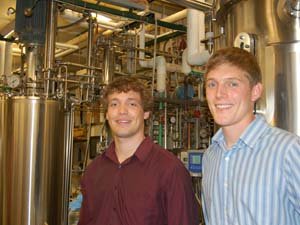Two recent CSE graduates launch start-up company based on atrazine treatment technology

Contacts:
Patty Mattern, University News Service, (612) 624-2801
John Merritt, Office of the VP for Research, (612) 624-2609
MINNEAPOLIS / ST. PAUL (07/29/2010) — An atrazine remediation technology based on the research of University of Minnesota biochemist Lawrence Wackett and microbiologist Michael Sadowsky will serve as the basis for a start-up company launched by two recent College of Science and Engineering graduates, Joe Mullenbach and Alex Johansson. NewWater, the start-up created by Mullenbach and Johansson, will offer a biocatalyst-based drinking water filtration technology that can reduce atrazine concentrations to acceptable levels.
Atrazine is a selective herbicide that is widely used by farmers in the United States to control broadleaf weeds and grasses. More than half of U.S. corn acreage, for example, is treated with atrazine. First registered for use in 1959, the Environmental Protection Agency (EPA) has long required water systems to test and treat for atrazine. In recent years the safety of atrazine has been the subject of much debate among scientists, and the EPA recently initiated a new scientific evaluation to determine whether current regulations need to be strengthened.
Mullenbach, a 2009 mechanical engineering graduate, and Johansson, a 2009 chemistry graduate, became interested in this clean technology when professor Sadowsky led a session of a Carlson School of Management course entitled Applied Technology Entrepreneurship. “It is an exciting technology that solves a difficult problem,” said Mullenbach. “The University’s Holmes Center for Entrepreneurship helped us immensely in transitioning from research to start-up company.” “We were intrigued when we first heard the presentation,” Johansson added. “We were able to combine the knowledge we gained in both business and engineering classes to create a commercially viable product that solves a significant public health issue.” In order to help create the start-up, in which the University holds an equity stake, the Venture Center (part of the Office for Technology Commercialization) offered guidance and crafted a license agreement that grants NewWater the use of three University patents. This is the tenth start-up company based on University technology that has been launched over the past 18 months.
In NewWater’s technology, enzymes developed by Wackett and Sadowsky will serve as a catalyst to initiate bacterial metabolism of atrazine, decomposing it into harmless by-products. The process does not produce a water waste stream, and it can treat to much lower levels of atrazine than can be achieved with the current solution, activated carbon.
“We are excited to see our basic research being developed into a technology that has a lot of potential,” said Wackett. “This technology will allow farmers to continue enjoying the benefits provided by atrazine while ensuring that the chemical isn’t finding its way into water supplies.”
NewWater was recently named a semifinalist in both the Minnesota Cup, an annual, statewide competition that seeks out aspiring entrepreneurs and their breakthrough ideas, and the Cleantech Open, the world’s largest cleantech business competition whose mission is to identify, fund and foster entrepreneurs whose ideas address today’s most urgent energy, environmental and economic challenges.
